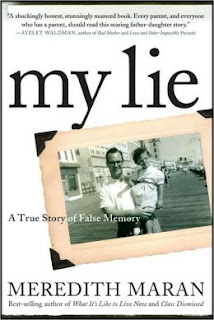Wednesday, February 6, 2013
The Truth About False Memories
Posted on 12:00 AM by Unknown
To celebrate Poison's release, I'm giving away THREE personalized copies of Poison by random drawing to commentors on this week's posts. To be eligible, you must leave a comment that includes your e-mail address. Must also live in the USA. Drawing will take place midnight on Saturday, February 9th. Winner announced here at Redwood's February 10th.
During the 80s, there were a number of children who falsely accused adults of molestation. Some of these adults were sent to prison and later found to be innocent.
You can read a little bit about that here.
For my second book in the Bloodline Trilogy, Poison, I researched how false memories can be created. I came across a non-fiction book called My Lie by Meredith Maran.
In her autobiography, Maran outlines how she began to believe she had been molested by her father, when in reality, she had not.
At the time, Maran was a journalist doing a number of pieces about child molestation. She was observing family therapy sessions where incest had occurred. Suddenly, very innocent things from her life (like dreaming about her father's hands) became evidence that her father had harmed her. Obviously, when she came to know the truth, her relationship with her father was significantly damaged.
There was a definite craze in the 80s about recalling repressed memories under hypnosis. This is problematic for a couple of reasons. One, is there such a thing as a repressed memory? That being that something traumatic is witnessed by a person and as a form of protection, the mind bundles it up and tucks it away until a later time where recalling the memory is safer.
Some say yes-- absolutely. Others say, no. You can read more about the different thoughts here which is a lengthy treatise but very interesting, balanced information.
The other problem is that hypnosis places the mind in a suggestible state and perhaps, a therapist with ill intentions, could use this suggestible state to introduce an idea into someone that they then begin to believe is true.
Is that possible? Hmm . . . you might have to read Poison to find out.
What we know from every day life is that some people believe things that are NOT true. And this belief in a lie can become great fodder for suspense novels. The eyewitness who falsely accuses. Possibly believing harm has come to you as a child when in fact, like Meredith, nothing insidious happened.
The question becomes, how do we prevent these false memories or false beliefs from harming other individuals? Is there a way to have a "perfect" justice system where only the truly guilty are imprisoned.
I don't know . . . sounds like another book.
Subscribe to:
Post Comments (Atom)















0 comments:
Post a Comment